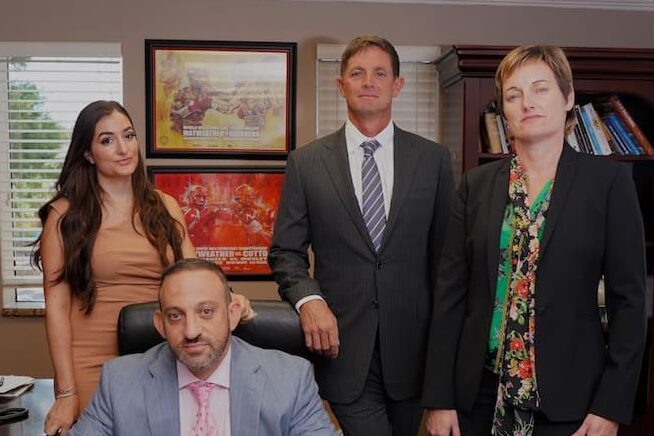If you live in Bonita Springs and have a disability that impairs your ability to work, you may qualify to receive Social Security Disability Insurance (SSDI) and/or Supplemental Security Income (SSI) benefits.
However, the process of applying for benefits is complex and challenging, and many claimants receive denials of their claims, particularly initial applications.
Work with a Bonita Springs Social Security Disability lawyer to navigate the process and improve your odds of success.
The personal injury attorneys at the Dolman Law Group have extensive experience handling Social Security Disability claims for clients throughout Bonita Springs and the surrounding areas. Contact us today for your free consultation.
- Why Choose Dolman Law Group to Handle Your Social Security Disability Claim in Bonita Springs
- What Is Social Security Disability Insurance?
- What Is Supplemental Security Income (SSI)?
- What Are Ways People Become Disabled in Bonita Springs?
- Why Do I Need a Social Security Disability Attorney?
- Social Security Disability FAQ
- Contact an Experienced Bonita Springs Social Security Disability Lawyer Today
Why Choose Dolman Law Group to Handle Your Social Security Disability Claim in Bonita Springs

At Dolman Law Group, we recognize the unique challenges that individuals with disabilities encounter, and we are committed to guiding our clients through the process of securing Social Security Disability benefits.
With a wealth of experience in disability law, our attorneys are well-versed in the intricacies of the legal system, ensuring that our clients receive the personalized attention and advocacy they need.
Our mission is to support those facing physical or mental health challenges, ensuring that they can access the financial assistance necessary to maintain a decent quality of life.
Whether you are applying for benefits for the first time, seeking an appeal, or navigating the complexities of the disability claims process, our skilled legal team is dedicated to achieving the best possible outcome for you.
We pride ourselves on our client-focused approach, understanding that each case is unique. We work diligently to build strong, individualized strategies tailored to the specific circumstances of our clients. You can trust that you are in capable hands, and we are committed to easing the burden of the disability claims process and securing the financial support you need.
Our Social Security Disability lawyers in Bonita Springs are driven by a passion for justice and a commitment to helping individuals overcome the challenges they face due to disabilities. Contact us today at (239) 307-2634 and let us guide you through the path to securing the Social Security Disability benefits you deserve.
Contact Our Bonita Springs Social Security Disability Lawyer Today
What Is Social Security Disability Insurance?
Social Security Disability Insurance (SSDI) is a federal program that provides financial assistance to individuals who are unable to work due to a qualifying disability.
Administered by the Social Security Administration (SSA), SSDI is designed to offer financial support to individuals who have worked and paid into the Social Security system but are no longer able to engage in substantial gainful activity due to a severe medical condition.
Key features of Social Security Disability Insurance:
1. Eligibility Criteria:
- To qualify for SSDI, individuals must have a qualifying disability that is expected to last for at least 12 months or result in death.
- Applicants must also have accumulated enough work credits by paying Social Security taxes through their employment.
2. Work Credits:
- Work credits are earned based on the amount of income on which individuals have paid Social Security taxes.
- The number of work credits required for eligibility depends on the age at which the disability occurs.
3. Medical Criteria:
- The SSA has a specific definition of disability, requiring that the individual is unable to perform substantial gainful activity due to a medical impairment.
- The impairment must be severe and expected to last for a continuous period or result in death.
4. Application Process:
- Applying for SSDI involves submitting a comprehensive application, including detailed information about the individual's medical condition, work history, and other relevant details.
- The process may also involve medical examinations and evaluations to assess the severity of the disability.
5. Waiting Period:
- There is a mandatory waiting period before individuals can start receiving SSDI benefits. This waiting period typically lasts five months from the onset of the disability.
6. Family Benefits:
- In addition to benefits for the disabled individual, certain family members, such as spouses and dependent children, may also be eligible for auxiliary benefits based on the individual's work record.
7. Medicare Eligibility:
- Individuals receiving SSDI benefits are eligible for Medicare after a 24-month waiting period, providing essential healthcare coverage.
SSDI is a critical safety net for individuals who find themselves unable to work due to a qualifying disability. The program offers financial support to help disabled persons maintain a reasonable standard of living.
What Is Supplemental Security Income (SSI)?
Supplemental Security Income (SSI) is a federal assistance program designed to provide financial support to individuals with limited income and resources who are aged, blind, or disabled.
Unlike Social Security Disability Insurance (SSDI), which is based on work history and contributions to the Social Security system, SSI is a needs-based program funded by general tax revenues.
Key features of Supplemental Security Income:
1. Eligibility Criteria:
- SSI is available to individuals who are aged (65 and older), blind, or disabled and have limited income and resources.
- The definition of disability for SSI purposes is similar to that of SSDI, focusing on the inability to engage in substantial gainful activity due to a medical impairment expected to last at least 12 months or result in death.
2. Income and Resource Limits:
- SSI has strict income and resource limits. Income includes wages, Social Security benefits, and other sources, while resources encompass assets such as real estate, bank accounts, and personal property.
- The limits are set to ensure that those with the greatest financial need receive assistance.
3. Application Process:
- Individuals can apply for SSI through the Social Security Administration (SSA). The application process typically involves providing detailed information about income, resources, and medical conditions. Thus, it helps to work with an attorney who can help you gather the necessary documentation and evidence.
- The SSA may request additional documentation and conduct interviews to determine eligibility.
4. Monthly Benefit Amount:
- The amount of the monthly SSI benefit is determined by federal regulations and may be supplemented by some states. The benefit is intended to help cover basic living expenses such as food, shelter, and clothing.
5. Medicaid Eligibility:
- SSI recipients are usually eligible for Medicaid, which provides essential healthcare coverage. Medicaid helps with medical expenses, including doctor visits, hospital stays, and prescription medications.
6. Continuing Eligibility Reviews:
- Eligibility for SSI is subject to periodic reviews to ensure that recipients still meet the criteria for the program. Changes in income, resources, or medical status may affect ongoing eligibility.
7. State Supplemental Payments:
- Some states, including Florida, provide additional payments to SSI recipients, supplementing the federal benefit to better address the cost of living. Work with an SSI attorney in Bonita Springs to determine your eligibility for supplemental assistance.
Supplemental Security Income plays a crucial role in providing a safety net for individuals who are elderly, blind, or disabled and have limited financial means. In the broader social safety net, it helps vulnerable individuals meet their basic needs and access necessary healthcare services.
What Are Ways People Become Disabled in Bonita Springs?

People can become disabled in Bonita Springs due to a wide range of circumstances and medical conditions. Disability can be the result of various factors, including accidents, injuries, illnesses, or congenital conditions.
Here are some common ways individuals in Bonita Springs may become disabled:
- Accidents and Injuries: Car accidents, workplace accidents, falls, and other traumatic events can lead to severe injuries that may result in short-term or long-term disabilities.
- Chronic Illnesses: Chronic medical conditions such as heart disease, diabetes, cancer, and respiratory disorders can progress to a point where individuals are no longer able to work or perform daily activities.
- Mental Health Conditions: Mental health disorders, including depression, anxiety, bipolar disorder, schizophrenia, and other conditions, can significantly impact a person's ability to work and maintain daily functioning.
- Neurological Disorders: Conditions affecting the nervous system, such as multiple sclerosis, Parkinson's disease, and epilepsy, can cause disabilities that affect mobility, coordination, and cognitive function.
- Musculoskeletal Disorders: Conditions like arthritis, back injuries, and other musculoskeletal disorders can result in chronic pain and limitations in mobility, impacting an individual's ability to work.
- Genetic or Congenital Conditions: Some individuals are born with disabilities or genetic conditions that manifest over time, affecting their ability to lead a fully independent and functional life.
- Degenerative Diseases: Diseases that cause progressive deterioration of bodily functions, such as amyotrophic lateral sclerosis (ALS) or Huntington's disease, can lead to significant disabilities.
- Infectious Diseases: Certain infectious diseases, especially when left untreated or inadequately managed, can lead to disabilities. For example, advanced stages of HIV/AIDS can result in disability.
- Autoimmune Disorders: Conditions like rheumatoid arthritis, lupus, and other autoimmune disorders can cause the immune system to attack healthy tissues, leading to disabilities.
- Vision or Hearing Loss: Progressive or sudden loss of vision or hearing can significantly impact an individual's ability to perform daily tasks and work.
The process of determining disability for programs like Social Security Disability Insurance (SSDI) or Supplemental Security Income (SSI) involves specific criteria set by the SSA.
Individuals seeking disability benefits may need to demonstrate that their medical condition meets the criteria for disability as defined by the SSA.
Seek the assistance of a Social Security Disability lawyer from Dolman Law Group for help with all aspects of your claim.
Why Do I Need a Social Security Disability Attorney?
Hiring a Social Security Disability attorney can help you for several reasons, including:
- Understanding the Legal Process: The application process for Social Security Disability benefits involves a complex set of rules and regulations. An experienced attorney knows the legal nuances, preparing your application correctly so it adheres to all requirements.
- Increasing the Chance of Approval: Statistics show that applicants who are represented by an attorney during the disability benefits process have higher approval rates than those who go through the process alone. Attorneys understand what evidence is needed to support your claim and can present your case more effectively.
- Navigating Appeals and Denials: If Social Security denies your initial application, which is common, you may appeal the decision. An attorney can guide you through the appeals process, gather additional evidence, and represent you at hearings if necessary.
- Compiling Medical Evidence: One of the key elements of a successful disability claim is strong medical evidence. A Social Security Disability attorney can compile the necessary medical records, reports, and expert opinions to strengthen your case.
- Communicating with the Social Security Administration: An attorney can handle communications with the Social Security Administration (SSA) on your behalf. This includes addressing any questions the SSA may have about your application, submitting additional information, and putting all necessary paperwork in order.
- Representing You at Hearings: If your case reaches the hearing stage, an attorney can present your case, question witnesses, and argue on your behalf, increasing your chances of a favorable outcome.
- Assisting with Complex Paperwork: An attorney can complete forms accurately and submit all required documentation in a timely manner.
- Knowing Disability Law: Social Security Disability attorneys stay updated on changes and developments in disability law. Their knowledge allows them to provide valuable guidance tailored to your specific situation.
An additional benefit of having an attorney help with your claim is peace of mind. You can rest easier knowing a knowledgeable legal professional is handling your claim for you so you can focus on other matters in your life.
Social Security Disability FAQ
Q: Is SSDI permanent?
A: In most cases, you will receive SSDI benefits as long as you’re disabled.
However, certain circumstances can affect your eligibility and whether you continue to receive benefits, such as:
- You return to work
- You reach retirement age (SSDI automatically converts to retirement benefits)
- You experience significant medical improvement
The SSA reviews cases periodically to ensure claimants are still eligible. You must keep the SSA informed of any changes that could affect your eligibility, and you should contact an SSDI attorney for guidance and counsel if the SSA denies or terminates your benefits.
Q: How Often Does the SSA Review Disability Eligibility?
A: The SSA conducts a Continuing Disability Review (CDR) periodically, depending on whether a claimant’s medical condition is expected to improve.
If your condition might improve, the SSA may review your case between six to 18 months after making its decision. If doctors don’t expect your condition to improve, the SSA will review it every three years. If doctors don’t expect your condition to improve, the SSA may only review about every seven years.
Q: How Much Does It Cost to Hire a Social Security Disability Lawyer?
A: Many Social Security Disability attorneys, including those at Dolman Law Group, work on a contingency fee basis. This means we only get paid if we help you obtain benefits. This arrangement can make legal representation more accessible for individuals facing financial challenges.
Q: How Can I Speed Up the Claims Process?
A: Your attorney can request expedited processing for cases involving severe disabilities or terminal illnesses. This could potentially speed up the decision-making process.
Q: What Happens to My Benefits When I Die?
A: SSDI benefits are not inheritable. After the recipient's death, surviving family members may receive survivor benefits, but the disability benefits themselves do not continue.
Contact an Experienced Bonita Springs Social Security Disability Lawyer Today

If you need assistance with your Social Security Disability claim in Bonita Springs, reach out to an experienced attorney at the Dolman Law Group right away.
We can help guide you through the intricacies of the application process to ensure you submit a solid and comprehensive claim. If the SSA denied your application, we can appeal the decision and fight to help you get the benefits you deserve.
We offer personalized attention and customized strategies based on your specific needs and goals, and we are fully committed to doing all we can to help you and your family obtain the financial assistance you need.
Contact us today at (239) 307-2634 for a no-cost review of your case and trustworthy advice and counsel.